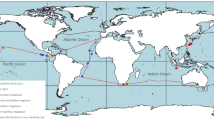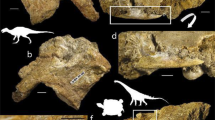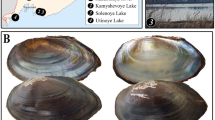Abstract
HÆMOGLOBIN is known from many groups of Crustacea, excluding Malacostraca; but it has not previously been found in the non-parasitic Cirripedia1. It is, therefore, interesting to record the occurrence of hæmoglobin in Balanus perforatus Bruguiére, a common intertidal barnacle of southern Britain, south-west Europe, the Mediterranean and north-west Africa.
This is a preview of subscription content, access via your institution
Access options
Subscribe to this journal
Receive 51 print issues and online access
$199.00 per year
only $3.90 per issue
Buy this article
- Purchase on Springer Link
- Instant access to full article PDF
Prices may be subject to local taxes which are calculated during checkout
Similar content being viewed by others
References
Fox, H. M., Nature, 179, 148 (1957).
Fox, H. M., and Vevers, G., The Nature of Animal Colours (Sidgwick and Jackson, London, 1960).
Knox, G. A., Stain Technol., 29, 139 (1954).
Pearse, A. G. E., Histochemistry (Churchill, London, 1960).
Crisp, D. J., and Southward, A. J., Phil. Trans. Roy. Soc., B, 243, 271 (1961).
Cannon, H. G., Phil. Trans. Roy. Soc., B, 233, 89 (1947).
Author information
Authors and Affiliations
Rights and permissions
About this article
Cite this article
SOUTHWARD, E. Hæmoglobin in Barnacles. Nature 200, 798–799 (1963). https://doi.org/10.1038/200798a0
Issue Date:
DOI: https://doi.org/10.1038/200798a0
Comments
By submitting a comment you agree to abide by our Terms and Community Guidelines. If you find something abusive or that does not comply with our terms or guidelines please flag it as inappropriate.



